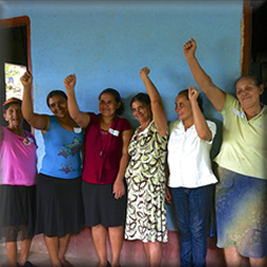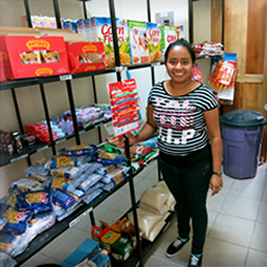Cooperative Strategic Development
Ético maximizes stakeholder value not only through smart financing but also through collaborative social and environmental development initiatives. Here are some demonstrations of what can be achieved through collaboration by actors from the entire supply chain.
Recognition of the Unpaid Work of Women

Ético, The Juan Fco Pas Silva Cooperative, Soppexcca and the Social Business Network are pioneers of the Recognition of the Unpaid Work of Women in ethical supply chains, through the creation of the first ever initiative that incorporates a component for women's unpaid work into the cost structures of contracts for coffee and sesame.
The unpaid work traditionally done mainly by women in the household and community represents an important input into production and one that should be valued and remunerated. The recognition of this work has the potential to empower women within the social infrastructure of a community as well as in the local economy. This belief is clearly stated in our Gender Policy:
"The role of women is seen as crucial to the development of the cooperatives and the community. We recognize the importance of the unpaid work that women do in support of production and our initiatives are framed to provide spaces and opportunities for women's activities to expand and be successful."
Ético deals primarily with the farmer household within the cooperative structure. Our knowledge has grown out of the experience of the Nicaraguan cooperatives and within this context and history we aim to empower all its
members equally and provide investment and training for all within the system. We aim to achieve an equal balance between men and women in all the activities we sponsor.The unpaid work traditionally done mainly by women in the household and community represents an important input into production and one that should be valued and remunerated. The recognition of this work has the potential to empower women within the social infrastructure of a community as well as in the local economy. This belief is clearly stated in our Gender Policy:
"The role of women is seen as crucial to the development of the cooperatives and the community. We recognize the importance of the unpaid work that women do in support of production and our initiatives are framed to provide spaces and opportunities for women's activities to expand and be successful."
Ético deals primarily with the farmer household within the cooperative structure. Our knowledge has grown out of the experience of the Nicaraguan cooperatives and within this context and history we aim to empower all its
Many stakeholders in our supply chains, including agricultural cooperatives, buyers, and ethical investors, have enthusiastically supported the initiative to include the Recognition of the Unpaid Work of Women in the cost structure of the supply chain. Through the expertise and support of ÉTICO researchers and gender specialists we approach the implementation of this initiative in an individualized manner with each supply chain and producer community.
The implementation of this initiative in sesame and coffee supply chains begins with strengthening the democratic organization of women within communities and expands to include savings and loans opportunities, educational programs, and better health and work benefits for cooperative jobs. Valuing the unpaid work of women thus becomes a catalyst for directing attention to the situation of women in global supply chains and in cooperatives. Through our experiences in Nicaragua, we have seen how public recognition of the unremunerated contributions of women in society has the potential to engage leaders to focus on empowering disadvantaged women in innovative and creative ways.
Read more about the initiative and its impact on the Social Business Network blog.
Organic Farming Development and Appropriate Technologies
Continually innovating farming techniques and ensuring that information and technologies are available to small-holder farmers is vital for the sustainability of supply chains as well as to the health of farm workers and the environment. Ético has brought producer cooperatives and buyers together to improve organic fertilizer production and farm management through facilitating information exchanges and the purchase of equipment. Together with shareholder Social Business Network blog, Ético work to match the needs of cooperative communities with the development visions of buyers resulting in collaborations that have worked with appropriate technologies such as smoke-free stoves, biodigestors, and drip irrigation for food security gardens. Investing in these appropriate technologies support farming communities in developing long-term social, environmental, and economic sustainability.

Cooperative Financing

Ético is committed to equal opportunity and affordable access to financing and provides opportunities for small-holder farmer cooperatives to develop autonomously, leading to greater financial security and the ability to support future generations in pursuing higher education and greater opportunities. These funds support development on a cooperative scale as well as on individual family scale. What began as a pilot project that was mainly used to purchase dairy cows for food security has now become ongoing portfolios held by several cooperatives that support a wide array of economic activities and has recently extended to include the fund for the Recognition of the Unpaid Work of Women. Uses include cattle rearing, small commerce, baking and house repairs as well as industrial technology and processing equipment. See our Investments page for the full picture.




